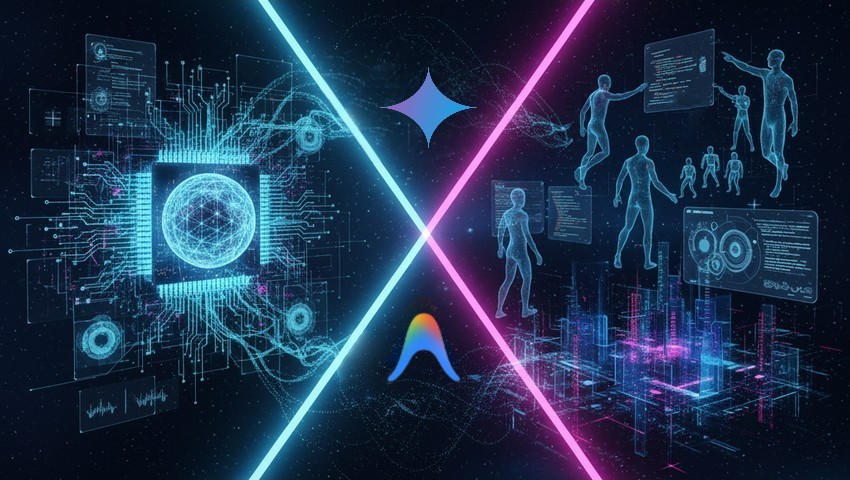
The new apex of AI intelligence by Google
Google is not just iterating; it’s defining the next era of computing. Hot on the heels of major breakthroughs like the Quantum Echoes, the technology giant is once again seizing the spotlight. This time, Google has simultaneously launched Gemini 3, its most intelligent and powerful AI model to date, alongside Google Antigravity – a pioneering agentic development platform. Together, these innovations are set to fundamentally transform how users interact with AI, whether they are learning complex subjects, writing code, or managing highly difficult, multi-step workflows.
Building on the foundations of Gemini 1 and 2, Gemini 3 combines multimodal understanding, advanced reasoning, and agentic capabilities into a single, powerful model. Google describes it as an advanced AI capable of understanding text, images, video, audio, and code with remarkable nuance and depth.
Key highlights of Gemini 3 across a range of AI benchmarks:
- Unmatched reasoning performance: Gemini 3 Pro tops the LMArena leaderboard with a score of 1501 Elo and demonstrates PhD-level reasoning on Humanity’s Last Exam (37.5%) and GPQA Diamond (91.9%).
- Advanced multimodal understanding: Scores 81% on MMMU-Pro and 87.6% on Video-MMMU, with 72.1% on SimpleQA Verified for factual accuracy.
- Enhanced agentic and vibe coding: Gemini 3 excels in zero-shot coding and complex web development, topping WebDev Arena (1487 Elo) and scoring 76.2% on SWE-bench Verified, which tests a model’s ability to generate code.
- Deep Think mode: For advanced reasoning tasks, Deep Think pushes performance even further, achieving 41% on Humanity’s Last Exam and 93.8% on GPQA Diamond.
With its 1 million-token context window, Gemini 3 can analyze extensive content, like academic papers, video lectures, or even handwritten family recipes, and generate interactive visualizations, code, or study materials. It can also provide actionable insights in everyday life, such as planning workflows, organizing inboxes, or optimizing personal routines.
Gemini 3’s intelligence is immediately available to users through new generative interfaces in Google Search and the Gemini app. These features – Visual Layout and Dynamic View – allow the AI to generate magazine-style UIs or interactive tools (like simulations and web apps) on the fly, transforming static answers into interactive experiences.
Alongside Gemini 3, Google introduced Antigravity – an integrated development environment (IDE) designed around agentic AI. Unlike traditional development environments, Antigravity positions AI agents as active collaborators rather than passive tools. Agents can autonomously plan and execute end-to-end software tasks across multiple surfaces: editor, terminal, and browser, while keeping users informed through Artifacts, which summarize progress, verification results, and actionable outputs.
The platform introduces two essential workspaces:
- Editor view: The familiar synchronous IDE experience for hands-on coding, powered by Gemini 3.
- Manager view: A "mission control" dashboard for orchestrating and monitoring multiple agents working asynchronously on different tasks or projects, multiplying developer throughput.
Core principles of Antigravity include:
- Trust: Agents produce verifiable Artifacts (task lists, screenshots, browser recordings) instead of raw tool logs, allowing developers to review logic at a glance.
- Autonomy: Agents control the editor, terminal, and browser, autonomously managing multi-step workflows.
- Feedback: Developers can provide asynchronous, inline feedback (like commenting on a Google Doc) directly on an Artifact or screenshot, which the agent incorporates without stopping its process.
- Self-improvement: The agent continuously learns from completed tasks and feedback, contributing code snippets and strategies to a knowledge base for future use.
Antigravity also integrates the Nano Banana Pro image generation model, allowing agents to generate UI mockups, diagrams, and other visual assets seamlessly within developer workflows.
With Gemini 3 and Antigravity, Google moves closer to its vision of artificial general intelligence (AGI). Users can now leverage AI not only to learn and explore but also to build, automate, and execute complex projects on their own.
